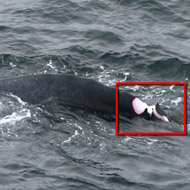Vessel strikes on whales underestimated, study finds

Almost 15 per cent of the humpbacks had injuries of scarring consistent with one or more vessel strikes.
The number of whales involved in strikes with vessels is underestimated, a new study has revealed.
Throughout the year, hundreds of humpback whales swim to the waters south of New England to feed. But the whales share their habitat with both commercial and recreational activities and are therefore at high risk of being struck by a vessel.
In a new study, scientists from the WDC (Whale and Dolphin Conservation) analysed more than 200,000 photos of 624 individual humpback whales. They assessed the proportion of humpbacks harbouring injuries compatible with blunt force trauma. For example, injuries involving propellers.
They found that almost 15 per cent of the humpbacks had injuries of scarring consistent with one or more vessel strikes.
“Sadly, this study underestimates the actual number of whales involved in vessel strikes as we could not account for impacts from blunt force trauma or cases where whales died as a result of the stroke,” said lead author Alex Hill.
He added that blunt force trauma may not leave a visible injury. Even in cases where a wound is detectable, it is not always possible to know if it is the same event as whales can be struck multiple times, he said.
While there are guidelines for vessels involved in whale watching, there are no regulations in place to reduce the chance of collisions with moving vessels. Regina Asmutis-Silvia, co-author of the study and executive director of the WDC, said the findings will be used to back the development of new guidelines for all vessels travelling in the vicinity of whales.
Although not part of the study, WDC notes that vessels are not only a concern for whales, but also for vessels and their passengers.
In December 2016, French sailor Kito de Pavant was rescued after his 60-ft racing yacht collided with a whale. The incident, which took place during the Vendee global yacht race, caused serious damage to the boat, leading it to take on water.
“We know whales are vital to keeping our oceans and planet healthy. If that’s not an argument to protect them, then perhaps the concerns about human safety resulting from a collision will be,” Regina concludes.
Vessel collision injuries on live humpback whales, Megaptera novaeangliae, in the southern Gulf of Maine, is published in Marine Mammal Science.



 The Veterinary Medicines Directorate (VMD) is inviting applications from veterinary students to attend a one-week extramural studies (EMS) placement in July 2026.
The Veterinary Medicines Directorate (VMD) is inviting applications from veterinary students to attend a one-week extramural studies (EMS) placement in July 2026.